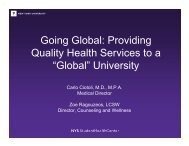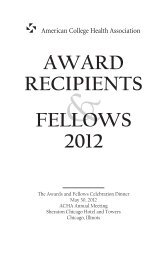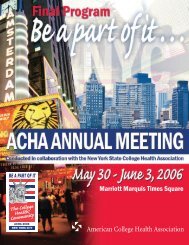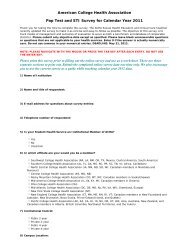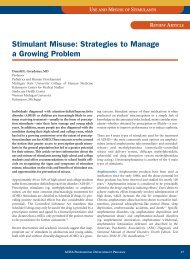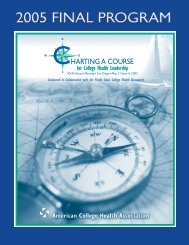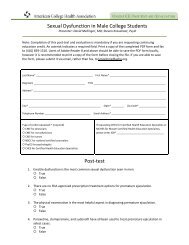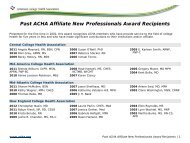2011-12 ACHA Annual Report - American College Health Association
2011-12 ACHA Annual Report - American College Health Association
2011-12 ACHA Annual Report - American College Health Association
- No tags were found...
You also want an ePaper? Increase the reach of your titles
YUMPU automatically turns print PDFs into web optimized ePapers that Google loves.
Table of ContentsA Message from the President andExecutive Director. . . . . . . . . . . . . . . . . . . . . . . . . . . . . . 3Membership . . . . . . . . . . . . . . . . . . . . . . . . . . . . . . . . . . . 4<strong>ACHA</strong> National Election. . . . . . . . . . . . . . . . . . . . . . . . . 5Liaisons and Collaborations. . . . . . . . . . . . . . . . . . . . . 6Advocacy . . . . . . . . . . . . . . . . . . . . . . . . . . . . . . . . . . . . . . 6Research and Data Collection. . . . . . . . . . . . . . . . . . . 8<strong>ACHA</strong>-NCHA . . . . . . . . . . . . . . . . . . . . . . . . . . . . . . . . . . . 8<strong>Health</strong>y Campus 2020 . . . . . . . . . . . . . . . . . . . . . . . . . . 9Updated and Revised <strong>ACHA</strong> Guidelines andStatements. . . . . . . . . . . . . . . . . . . . . . . . . . . . . . . . . . . .10JACH Online Archive and Additional Issues . . . . .10Online Continuing Education Program. . . . . . . . .11Online Call for Programs forAffiliate Meetings . . . . . . . . . . . . . . . . . . . . . . . . . . . . .<strong>12</strong><strong>Annual</strong> Meeting . . . . . . . . . . . . . . . . . . . . . . . . . . . . . . .<strong>12</strong>The <strong>American</strong> <strong>College</strong> <strong>Health</strong> Foundation . . . . . .13<strong>ACHA</strong> Financial <strong>Report</strong> . . . . . . . . . . . . . . . . . . . . . . . .14<strong>2011</strong> Balance Sheet Highlights. . . . . . . . . . . . . . . . .14<strong>2011</strong> Operating Highlights . . . . . . . . . . . . . . . . . . . .14Consolidated Statement of Activities andChanges in NET Assets. . . . . . . . . . . . . . . . . . . . . . . . .15MissionThe <strong>American</strong> <strong>College</strong> <strong>Health</strong> <strong>Association</strong>(<strong>ACHA</strong>) will be the principal advocateand leadership organization for collegeand university health. The associationwill provide advocacy, education, communications,products, and services, aswell as promote research and culturallycompetent practices to enhance its members’ability to advance the health of allstudents and the campus community.VisionTo be the recognized voice of expertise incollege health.<strong>American</strong> <strong>College</strong> <strong>Health</strong> <strong>Association</strong>1362 Mellon RoadSuite 180Hanover, MD 21076(410) 859-1500 (office)(410) 859-1510 (fax)www.acha.org<strong>ACHA</strong> Social Media<strong>ACHA</strong> continues using social mediaplatforms Facebook and Twitter toexpand its visibility among the generalpublic.<strong>ACHA</strong> uses Facebook and Twitter to share generalhealth/industry news, <strong>Annual</strong> Meeting updates,and association-related news with both membersand non-members. Our followings continue togrow. Please help us by spreading the word tofriends and colleagues.https://www.facebook.com/<strong>American</strong><strong>College</strong><strong>Health</strong><strong>Association</strong>http://twitter.com/<strong>ACHA</strong>_TweetsGet <strong>ACHA</strong> 2013 <strong>Annual</strong> Meeting updates via Twitter! Use #<strong>ACHA</strong>13.<strong>ACHA</strong> Highlights of Projects and Programs for the Programming Year June <strong>2011</strong>-May 20<strong>12</strong> | 2
A Message from the President and Executive DirectorAnita Barkin, DrPH, MSN, CRNP<strong>ACHA</strong> President,<strong>2011</strong>-20<strong>12</strong>Doyle E. Randol, MS,Col. USA (Ret.)<strong>ACHA</strong> Executive DirectorWe are pleased to provide you with the<strong>American</strong> <strong>College</strong> <strong>Health</strong> <strong>Association</strong><strong>2011</strong>-20<strong>12</strong> <strong>Annual</strong> <strong>Report</strong>, a synopsisof the achievements of our associationand membership in advancing the fieldof college health and improving thehealth of the nation’s 20 million collegestudents. <strong>ACHA</strong> is a member-drivenorganization, so through this report, wegratefully acknowledge our membersfor their ongoing commitment to the<strong>ACHA</strong> mission and for their continuedsupport of the <strong>American</strong> <strong>College</strong> <strong>Health</strong>Foundation.Specifically, this report provides an overview of theassociation’s activities during the program year,June 5, <strong>2011</strong>, through June 1, 20<strong>12</strong>. The Financial<strong>Report</strong> reflects financial information for our fiscalyear, January 1 through December 31, <strong>2011</strong>.While many challenges faced college healthover the past year, perhaps none were moreimportant than the federal government’s progresstoward finalizing regulations for student healthinsurance programs under the Affordable CareAct. <strong>ACHA</strong>’s focus was centered on pressing forthe publication and release of these regulations,which finally occurred on March 16, 20<strong>12</strong>.Affordable Care Actand Student <strong>Health</strong>InsuranceWe are pleased to highlight this and otheraccomplishments in the past program year:We remained steadfastly committed,throughout the advocacy process, to preservingcomprehensive student health insurance plansthat conform to <strong>ACHA</strong>’s guidelines documentStandards for Student <strong>Health</strong> Insurance/BenefitsPrograms. We have consistently advocatedfor the continuation of such plans, and theimprovement of plans that did not meet thesestandards.Our continuing partnerships with other nationalhealth and higher education organizationsand the private sector supported educationalmaterials and events and promoted theintersection of college health and wellness withpublic health and higher education issues.Our <strong>ACHA</strong>-National <strong>College</strong> <strong>Health</strong> Assessment(<strong>ACHA</strong>-NCHA) continued to increase itsreputation as the foremost research survey oncollege student health. With the completion oftwo more survey periods (Fall <strong>2011</strong> and Spring20<strong>12</strong>), more than one million students at over600 universities have participated.Our published guidelines and recommendationson pressing college health topics — immunizations,tobacco use, campus violence, sexual violence,standards of practice for health promotionand others — provided the field with importantclinical and health promotion guidance, discussionpoints for programming, and assessmenttools for professional and program development.Our annual meeting in Chicago providedover 2,000 attendees with a five-day forumto exchange programming ideas, networkwith colleagues, and enhance professionaldevelopment. During this event, we focusedon advocacy and innovation in the collegehealth field, under an annual meeting theme of“<strong>College</strong> <strong>Health</strong>: Architects of Change.”We are proud that our members’ dedication toresearch, education, standards, and advocacy hasenabled our association to continue to positivelyimpact the health of our nation’s college students.<strong>ACHA</strong> Highlights of Projects and Programs for the Programming Year June <strong>2011</strong>-May 20<strong>12</strong> | 3
By working together to impact the livesof students and campus communities,members have the ability to strengthencitizenship, the learning environment,and the future health of our society.As of May 31, 20<strong>12</strong>, <strong>ACHA</strong> had 2,860 individualmembers, 831 institutional members, and 22sustaining members (i.e., organizations withintersecting interests in college health).Membership<strong>ACHA</strong> individual membership was comprised ofnine sections that reflect the wonderful diversityof college health: Administration, AdvancedPractice Clinicians, Clinical Medicine, <strong>Health</strong>Promotion, Mental <strong>Health</strong>, Nurse-Directed <strong>Health</strong>Services, Nursing, Pharmacy, and Students/Consumers. Their proportionate sizes were asdepicted in the chart below.Members of <strong>ACHA</strong> also held automaticmembership in regional affiliate organizations:Central, Mid-America, Mid-Atlantic, New England,New York State, North Central, Ohio, PacificCoast, Rocky Mountain, Southern, and Southwest<strong>College</strong> <strong>Health</strong> <strong>Association</strong>s. Their relativemembership levels are also illustrated below.<strong>ACHA</strong> Highlights of Projects and Programs for the Programming Year June <strong>2011</strong>-May 20<strong>12</strong> | 4
<strong>ACHA</strong> conducted the national electionof association officers and regionalrepresentatives to the Board of Directorsand section officers in March and April20<strong>12</strong>. Online voting as well as mail-inballots were available to <strong>ACHA</strong> members.Some section officers were elected attheir section business meetings at the<strong>Annual</strong> Meeting.The following individuals were elected as<strong>Association</strong> Officers:President-elect: Pat Ketcham, PhD, CHES, OregonState UniversityTreasurer: Charley Bradley, RNBC, Dartmouth<strong>College</strong>The following individuals were elected asBoard Regional Representatives:Region I Representative: Beverly Kloeppel, MD,MBA, University of New MexicoRegion III Representative: Marsha Tilden, MS, RN,CS, Ohio Wesleyan UniversityRegion V Representative: Joleen Nevers, MAEd,CHES, University of ConnecticutThe following individuals were elected asSection Officers:Administration SectionChair-elect: Mary Beth Katitus, BS, MPA, CaseWestern Reserve UniversitySecretary: Ann Nadler, MA, University of Missouri-Columbia<strong>ACHA</strong> National ElectionNew Executive Committee for 20<strong>12</strong>-2013 left to right: President-electPat Ketchum, PhD, CHES; Vice President Sarah Van Orman, MD, MMM;Now Immediate Past President Anita Barkin, DrPH, MSN, CRNP; NewPresident Jenny Haubenreiser, MA, F<strong>ACHA</strong>; Treasurer Charley Bradley,RNBC; Executive Director Doyle E. Randol, MS, Col. USA (Ret.)Program Planner-elect: Jenny Soyke, MD,University of OregonAdvanced Practice Clinicians SectionChair-elect: Deborah Mathis, BSN, MSN, CRNP,University of PennsylvaniaSecretary: Marty Reuman Pieper, MSN, FNP-BC,Bentley UniversityClinical Medicine SectionChair-elect: John A. Vaughn, MD, The Ohio StateUniversitySecretary: Cheryl Flynn, MD, MS, MA, University ofVermontPlanner-elect: Beth Wichman, MD, The Universityof Texas at San Antonio<strong>Health</strong> Promotion SectionChair-elect: Alicia K. Czachowski, MPH, CHES,Northern Illinois UniversitySecretary: Gwyn Ashcom, MPH, CHES, PortlandState UniversityProgram Planner-elect: Michelle Cohen, MPH,CHES, Georgia Institute of TechnologyMental <strong>Health</strong> SectionChair-elect: Belinda McIntosh, MD, EmoryUniversitySecretary: Joy D. Wyatt, PhD, Baldwin-Wallace<strong>College</strong>Program Planner-elect: Drayton Vincent, MSW,Louisiana State UniversityNurse-Directed <strong>Health</strong> Services SectionChair-elect: Vicky Rosa, RN, MHA, Butler UniversitySecretary: Donna Willome, ANP-BCProgram Planner-elect: Shari T. Shapleigh, BS, BSN,MS, FNP-CNursing SectionChair-elect: Linda Reid, RN-BC, BA, Oregon StateUniversitySecretary: Mendy M. Escudier, RN, BSN, LouisianaState UniversityProgram Planner-elect: Martha Davis Gollin, BSN,MBA, The University of GeorgiaPharmacy SectionChair-elect: Tabby Ragland, PharmD, MiddleTennessee State UniversityStudent SectionChair: Eduardo Galindo, University of UtahChair-elect: Chris Schaefbauer, University ofColorado-Boulder<strong>ACHA</strong> Highlights of Projects and Programs for the Programming Year June <strong>2011</strong>-May 20<strong>12</strong> | 5
Liaisons and CollaborationsThroughout the year <strong>ACHA</strong> continued importantliaison relationships and collaborations with:Accreditation <strong>Association</strong> for Ambulatory <strong>Health</strong>Care (AAAHC)Centers for Disease Control and Prevention -Advisory Committee on Immunization Practices(CDC-ACIP)Coalition of Higher Education <strong>Association</strong>s forSubstance Abuse Prevention (CoHEASAP)Coalition of National <strong>Health</strong> EducationOrganizations (CNHEO)Council for the Advancement of Standards inHigher Education (CAS)Gay and Lesbian Medical <strong>Association</strong> (GLMA)Higher Education Mental <strong>Health</strong> Alliance(HEMHA)The Joint Commission - Ambulatory CareProfessional and Technical Advisory Committee(PTAC)The Journal of <strong>American</strong> <strong>College</strong> <strong>Health</strong> (JACH)National Athletic Trainers’ <strong>Association</strong> (NATA)National Collegiate Athletic <strong>Association</strong> - FemaleAthlete Triad Coalition (NCAA-FATC)National Operating Committee for Standards inAthletic Equipment (NOCSAE)<strong>ACHA</strong>’s partnerships with these national healthand higher education organizations helped toenhance resources for the college health fieldand continue to integrate college health into thenational health agenda.<strong>ACHA</strong>’s efforts throughout the summerand fall <strong>2011</strong> were centered onmonitoring and influencing the federalgovernment’s progress towardfinalizing regulations for studenthealth insurance programs (SHIPs)under the Affordable Care Act (ACA)and pressing for their publicationand release.In September <strong>2011</strong> <strong>ACHA</strong> completed submissionof its formal comments on the Departmentof <strong>Health</strong> and Human Services (HHS)draft regulations for Affordable <strong>Health</strong> InsuranceExchanges (the state exchanges createdin the affordable care act). Regarding the finalregulations, <strong>ACHA</strong> urged HHS to:Enable student health insurance plans tocompete on a level playing field with otherindividual coverage options;Provide lower income students who areeligible for the premium subsidy with amechanism for access to the tax credit;Ensure that student health insurance planswould not be subject to disproportionateassessments and user fees if they participatein the exchanges;Accommodate the unique residency issuesfor students studying out of state withregard to their eligibility to participate ina state-based exchange; and,Accommodate the unique enrollmentperiods for student health insurance plans.AdvocacyIn October <strong>2011</strong>, <strong>ACHA</strong> furthered its advocacyefforts regarding Medicaid paymentof premiums for student health insurancefor lower income students. Under the provisionsof the ACA, there may be a significantincrease in the number of college studentswho will be deemed Medicaid eligible. <strong>ACHA</strong>argued that from a cost/benefit perspective,allowing these students to opt into studenthealth insurance plans with Medicaid payingtheir premiums, rather than relying on theirMedicaid coverage alone, may offer a win-winstrategy for the student and the state. Allowingstudents to purchase the student plan willaddress access to care limitations for studentsstudying out-of-state and in areas where networklimitations and access to providers presentbarriers to care and provide cost-savingsto states. <strong>ACHA</strong> began assessing the impact ofthe new student health insurance regulationsregarding this continued Medicaid paymentoption for states since the draft regulationsspecifically re-categorized student health insuranceplans (SHIPs) as individual insurancecoverage, which could prove problematic.Also in October, HHS noted the release ofan Institute of Medicine <strong>Report</strong> entitled“Essential <strong>Health</strong> Benefits: Balancing Coverageand Cost.” <strong>ACHA</strong> submitted comments toHHS addressing coverage and cost balancingfor college student health plans, essentiallyembracing the concept, but reminding HHSof the unique features of college students andtheir insurance needs.Continued on next page . . .<strong>ACHA</strong> Highlights of Projects and Programs for the Programming Year June <strong>2011</strong>-May 20<strong>12</strong> | 6
Advocacy continued . . .In mid-November <strong>2011</strong>, <strong>ACHA</strong> PresidentBarkin attended an HHS Listening Sessionon Essential <strong>Health</strong> Benefits in New York City,where she provided testimony about essentialhealth benefits that should be included incollege students’ coverage. A copy of the testimonywas posted on the <strong>ACHA</strong> website. Inthat same month, <strong>ACHA</strong> conducted a Student<strong>Health</strong> Insurance Stakeholders ConferenceCall that included 20 organizations (insuranceindustry and higher education associations).In January 20<strong>12</strong>, <strong>ACHA</strong> commissionedexperts with McKenna Long & Aldridge LLPto produce a legal analysis regarding twoACA issues: a) whether or not SHIP subscriberswould qualify for the tax subsidy, and b)whether or not state Medicaid dollars couldcontinue to be paid to SHIPs when the studentis eligible for Medicaid and the statedeems use of the SHIP to be cost-effective.Also in January, <strong>ACHA</strong> worked with <strong>American</strong>Council on Education (ACE) to respond toquestions from the Young Invincibles (anational organization representing the interestsof 18 to 34 year-olds) regarding SHIPs andMedicaid. In February 20<strong>12</strong>, <strong>ACHA</strong> reachedout to institutions to encourage those thatmight decide to discontinue offering SHIPsbecause of cost implications from the ACA toprovide timely and thorough notification totheir students. Additionally, leadership from<strong>ACHA</strong> and the Young Invincibles continued todiscuss other questions regarding SHIPs andMedicaid.<strong>ACHA</strong> joined ACE and other higher educationorganizations in a March 2, 20<strong>12</strong>, letter urgingHHS to release long-awaited final SHIP regulations,emphasizing the challenges and impactsfor campuses in both negotiating insurance contractsand preparing financial aid packages forthe 20<strong>12</strong>-13 academic year.On March 16, 20<strong>12</strong>, HHS released final regulationsfor SHIPs under ACA; <strong>ACHA</strong> notified membershipand began analysis of final regulations. OnMarch 27, 20<strong>12</strong>, <strong>ACHA</strong> leadership participatedin a conference call with health policy experts atthe Center on Budget and Policy Priorities (CBPP)regarding SHIPs and Medicaid. Follow up conversationswere held in April and May with representativesfrom institutions of higher education thathave successfully used Medicaid funds to purchaseSHIPs on a cost-effective basis for qualifyingstudents. Summaries of those experiences werelater shared with CBPP.On April <strong>12</strong>, 20<strong>12</strong>, FAQs regarding the final federalregulations for SHIPs under ACA were posted tothe <strong>ACHA</strong> website. Also in April, <strong>ACHA</strong> workedwith ACE to submit information on self-fundedstudent health benefit plans (SHBPs) to HHS. Theletter acknowledged the HHS Secretary’s authorityunder the ACA to designate other types of coverageas minimum essential coverage, and urgedthe Secretary to specify that “self-funded SHBPswhich substantially comply with the required elementsof ‘student health insurance coverage’ asdefined in the final SHIP regulations are a formof ‘minimum essential health coverage’,” therebysatisfying the individual mandate. A copy of theletter was posted to the <strong>ACHA</strong> website.Also in April, upon learning that the White Housewas adding a new tool to the <strong>College</strong> Affordabilityand Transparency Center that would assist prospectivestudents and families in comparingcollege costs, <strong>ACHA</strong> submitted comments onthe proposed <strong>College</strong> ScoreCard, recommendinga uniform definition for computing cost ofattendance (COA) that includes the student’shealth related costs (administrative healthfees and health insurance premiums), suchthat these costs would be consistently andopenly factored into the <strong>College</strong> ScoreCard.In May 20<strong>12</strong>, <strong>ACHA</strong> developed a brief documentto summarize the final SHIP regulationsand impact on college health plans. This documentsupplemented the more detailed FAQdocument. It was shared at the 20<strong>12</strong> <strong>Annual</strong>Meeting and posted to the <strong>ACHA</strong> website.By the end of May 20<strong>12</strong>, <strong>ACHA</strong>’s priority ACAadvocacy focus areas were:Medicaid funding for payment of studenthealth insurance premiumsAccess to the premium subsidy tax creditfor eligible students (or their parents) whopurchase student health insuranceClarification about how self-funded SHBPsmay be recognized as minimum essentialhealth coverageMany of the documents and announcementsmentioned above may be accessed throughthe <strong>ACHA</strong> website. In supporting theseefforts, <strong>ACHA</strong> senior leaders received invaluableassistance and expertise from the leadersof the <strong>ACHA</strong> Student <strong>Health</strong> Insurance andBenefits Plans Coalition.<strong>ACHA</strong> Highlights of Projects and Programs for the Programming Year June <strong>2011</strong>-May 20<strong>12</strong> | 7
Research and DataCollectionThroughout the year <strong>ACHA</strong>assisted various groups within theassociation in collecting relevantdata to support their work.The surveys conducted from June <strong>2011</strong>through May 20<strong>12</strong> included:<strong>ACHA</strong>-CDC Get Yourself Tested Survey<strong>ACHA</strong>-CDC NCHA International vs.Domestic Students Survey<strong>ACHA</strong>-CDC TB & Vaccine-PreventableDisease Practices on <strong>College</strong>Campuses Survey<strong>ACHA</strong> Faculty and Staff Coalition<strong>Health</strong> Promotion and WellnessPrograms Survey<strong>ACHA</strong>-National <strong>College</strong> <strong>Health</strong>Assessment II<strong>ACHA</strong> Nursing ProtocolPre-Conference 20<strong>12</strong>Administration SectionNeeds AssessmentClinical Medicine SectionNeeds Assessment<strong>Health</strong> Promotion SectionNeeds AssessmentM<strong>ACHA</strong> Election SurveyNational <strong>College</strong> DepressionPartnership Participation SurveyNursing Section Needs AssessmentPatient Satisfaction Assessment SurveyPap Test and STI Survey forCalendar Year 2010<strong>ACHA</strong>-National <strong>College</strong> <strong>Health</strong> Assessment (<strong>ACHA</strong>-NCHA)Our premier surveying instrument onstudent health continued with strongparticipation. The Fall <strong>2011</strong> <strong>ACHA</strong>-NCHAII Reference Group included data from27,774 students at 44 institutions and theSpring 20<strong>12</strong> Reference Group includeddata from 90,666 students at 141institutions.Minor revisions were made to the surveybeginning in fall <strong>2011</strong> to address four points:Question 16 was reworded to addressfeedback received from victim advocatesthat the previous wording on the sexualconsent portion of the question could beinterpreted as victim blamingQuestion 54 was reworded to clarify theracial/ethnic categoriesQuestion 65 was reworded to addressfeedback from students with disabilitiesand their advocatesQuestion 66 was added to capture returnedveteran status as a student demographic<strong>ACHA</strong> Highlights of Projects and Programs for the Programming Year June <strong>2011</strong>-May 20<strong>12</strong> | 8
<strong>Health</strong>y Campus 2020<strong>Health</strong>y Campus 2020, a new frameworkfor improving the health of all students,staff, and faculty on campuses nationwide,was previewed to attendees at the<strong>ACHA</strong> 20<strong>12</strong> <strong>Annual</strong> Meeting in Chicago.Based on <strong>Health</strong>y People 2020, the U.S.Department of <strong>Health</strong> and HumanServices’ health promotion and diseaseprevention agenda, <strong>Health</strong>y Campus 2020will help institutions of higher educationbecome healthier places to live, work,learn, and play.<strong>Health</strong>y Campus 2020 is a framework that isgrounded in the principle that health extendsbeyond traditional interventions of education,diagnosis, treatment, and health care at clinicallevels. Through the collaborative efforts of health,academic, student affairs, and administrative colleagues,<strong>Health</strong>y Campus 2020 strives to engagemultiple campus and community stakeholders totake actions that are driven by the best availableevidence and knowledge to strengthen policies,improve practices, and improve health outcomes.With 75 national objectives, <strong>Health</strong>y Campus 2020identifies current and ongoing nationwide healthimprovement priorities in higher education whileincreasing campus community awareness andunderstanding of determinants of health, disease,and disability and the opportunities for progress.The health objectives in <strong>Health</strong>y Campus 2020were derived from <strong>Health</strong>y People 2020 and wereselected based on their relevance to collegehealth and the existence, with rare exception, of anational data source to measure and benchmark.Connect. Collaborate. Create.healthycampus 2020The national student objectives are comprised of11 topic areas and 54 objectives. To better align<strong>Health</strong>y Campus 2020 with the academic goals ofinstitutions of higher education, a new topic area,Academic Impediments, was included.<strong>Health</strong>y Campus 2020 is a web-based format,allowing higher education professionals, regardlessof professional affiliation, to utilize these<strong>Health</strong>y Campus resources, tailor information totheir needs, and explore evidence-based toolkitsfor implementation. The website is locatedat www.acha.org/healthycampus.<strong>Health</strong>y Campus 2020 is a result of a multiyear processthat reflects the thoughts and perspectivesof over 600 diverse higher education professionalsrepresenting multiple professional organizationsand disciplines. <strong>ACHA</strong>’s National <strong>Health</strong>Objectives Coalition for 2020 (now renamed the<strong>Health</strong>y Campus Coalition) provided leadershipon the research, planning, and writing of <strong>Health</strong>yCampus 2020.<strong>ACHA</strong> Highlights of Projects and Programs for the Programming Year June <strong>2011</strong>-May 20<strong>12</strong> | 9
Updated and Revised <strong>ACHA</strong> Guidelines and StatementsIn November <strong>2011</strong>, <strong>ACHA</strong>’s Alcohol, Tobacco,and Other Drugs Coalition revised the PositionStatement on Tobacco on <strong>College</strong> and UniversityCampuses. Changes to this document includethe addition of electronic cigarettes to the listof tobacco-derived or containing productsand updates to data contained within thestatement. The position statement was reprintedin Volume 60, Issue 3, 20<strong>12</strong> of the Journal of<strong>American</strong> <strong>College</strong> <strong>Health</strong> (JACH).In March 20<strong>12</strong>, the <strong>ACHA</strong> Vaccine-Preventable Diseases Committee updated theRecommendations for Institutional PrematriculationImmunizations (RIPI) guidelines document toreflect new vaccine recommendations fromthe CDC Advisory Committee on ImmunizationPractices (ACIP). The RIPI updates includedupdated recommendations on HPV vaccine, alongwith changes to the sample immunization recordlist of countries with TB incidence rates of ≥ 20cases per 100,000 population. Additional minorrevisions were made to the RIPI in April. The RIPIguidelines document was reprinted in Volume 60,Issue 5, 20<strong>12</strong> of the JACH.In April 20<strong>12</strong>, The <strong>ACHA</strong> GuidelinesTuberculosis Screening and Targeted Testing of<strong>College</strong> and University Students was updatedby the Emerging Public <strong>Health</strong> Threats andEmergency Response Coalition to include clearerguidelines for testing and screening for TB, alongwith changes to the appendices. The coalition hasalso created a new companion resource,“Tuberculosis Screening and Targeted Testing of<strong>College</strong> and University Students: FAQs,” whichaddresses commonly asked questions about boththe <strong>ACHA</strong> guidelines and TB screening in general.In May 20<strong>12</strong>, the <strong>ACHA</strong> Standards of Practicefor <strong>Health</strong> Promotion in Higher Education (SPHPHE)was updated by the <strong>ACHA</strong> <strong>Health</strong> PromotionSection. Like previous editions, the third editionof the SPHPHE serves as a guideline for theassessment and quality assurance of healthpromotion in higher education. The third editionalso acknowledges additions to the body ofknowledge and makes explicit the scope ofpractice and essential functions for the field.JACH Online ArchiveIn November <strong>2011</strong>, Taylor &Francis (publisher of the Journalof <strong>American</strong> <strong>College</strong> <strong>Health</strong>) and<strong>ACHA</strong> announced that JACHarticles will be available onlinebefore they appear in print.This new benefit enabled <strong>ACHA</strong> membersto begin seeing content online upto a few months ahead of it actuallyappearing in a printed journal issue.Members may access this advancecontent free via the <strong>ACHA</strong> website andits “Access JACH Online Archives” portalto the JACH website. The “ForthcomingArticles” link will access any contentavailable but not yet assigned to aprint issue.<strong>ACHA</strong> Highlights of Projects and Programs for the Programming Year June <strong>2011</strong>-May 20<strong>12</strong> | 10
Online Continuing Education ProgramIn order to expand opportunity forcontinuing education for college healthprofessionals, <strong>ACHA</strong> added 11 Online CEPrograms from the <strong>2011</strong> <strong>Annual</strong> Meeting,bringing the total number of offerings to17. With the addition of these sessions,<strong>ACHA</strong> experienced a noticeable increasein participation in this program.Programs offered through December 20<strong>12</strong>:Anxiety Disorder, Panic Disorder, Social Phobia,and Obsessive Compulsive DisorderPresenter: Lorrin Koran, MD, Stanford UniversityMedical CenterEvaluation of Fever in the Returned TravelerPresenter: Jean Haulman, MD, University ofWashingtonEvidence-based Practice: A Necessary Strategyfor Improving the Mental and Physical <strong>Health</strong> of<strong>College</strong> StudentsPresenter: Bernadette Melnyk, PhD, RN, CPNP/PMNNP, FNAP, FAANFatigue in the <strong>College</strong> StudentPresenter: Bruce Helming, MD, University ofArizonaFrom Recreational to Functional Use: The NewWave of Collegiate Drug Use in Changing TimesPresenter: Ross Aikins, MA, University California,Los Angeles<strong>Health</strong>y Minds Study: The Connection betweenMental <strong>Health</strong> and Academic Success, and OtherMain FindingsPresenter: Daniel Eisenberg, PhD, University ofMichigan School of Public <strong>Health</strong>A Home Away from Home: <strong>College</strong> <strong>Health</strong> andthe Patient-Centered Medical HomePresenter: Evelyn Wiener, MD, University ofPennsylvaniaManagement of Distal Extremity Injuries in<strong>College</strong> <strong>Health</strong>Presenter: John Vaughn, MD, The Ohio StateUniversityMaking Room for <strong>Health</strong> Promotion in StudentLearning Outcomes and AccountabilityMeasuresPresenters: Todd Misener, MPH, Alissa Arnold, andKathryn Steward, MPH, CHES, Western KentuckyUniversityA Nurse/Clinician Process to Speed Assessment/Treatment of Large Number of PatientsPresenters: Stephen Hughes, MD, Nianne Vanfleet,RN, MS, and Martha Williams, RN, BS, CornellUniversityOverview of InsomniaPresenter: Victoria Judd, MD, MBA, University ofUtahSexual Dysfunction in Male <strong>College</strong> StudentsPresenters: David Mellinger, MD, Duke University,and Steven Kraushaar, PsyD, WashingtonUniversity in St. LouisUpdate on Epidemiology, Diagnosis, andTreatment of Syphilis in the United States, 2008Presenters: Melanie Taylor, MD, MPH, ArizonaDepartment of <strong>Health</strong> and Services, and EleanorDavidson, MD, Case Western Reserve UniversityUsing Social Media and Other InteractiveTechnologies to Support Take Care NYU, aUniversity-wide Preventive <strong>Health</strong> and WellnessInitiativePresenter: Carlo Ciotoli, MD, MPA, and AllisonSmith, MPA, New York UniversityWomen’s <strong>Health</strong> UpdatePresenter: Alexandra Hall, MD, and Beth Cutler, NP,Cornell UniversityPrograms offered through December 2013:Homicide-Suicide (2008 Dorosin MemorialLecture)Presenter: Phillip J. Resnick, MD, Case WesternReserve UniversityRisk Assessment for ViolencePresenter: Phillip J. Resnick, MD, Case WesternReserve University<strong>ACHA</strong> Highlights of Projects and Programs for the Programming Year June <strong>2011</strong>-May 20<strong>12</strong> | 11
Online Call for Programsfor Affiliate Meetings<strong>ACHA</strong> National Office staff workedwith the program planners of fiveof the <strong>ACHA</strong> affiliates to tailor theonline Call for Programs (CFP) forthe affiliates’ annual meetings.This further streamlined <strong>ACHA</strong>’s onlineCE review process and the affiliateplanners’ management of programsubmissions.<strong>ACHA</strong> hopes to be able to offer thisenhanced service to other affiliateswho choose to use <strong>ACHA</strong>’s continuingeducation review for their annualmeetings.<strong>ACHA</strong> conducted the 20<strong>12</strong> <strong>ACHA</strong> <strong>Annual</strong>Meeting May 28-June 1, 20<strong>12</strong>, at theSheraton Chicago Hotel and Towers inChicago, Illinois, in collaboration withMid-America <strong>College</strong> <strong>Health</strong> <strong>Association</strong>.The conference was a very successfulevent with an attendance of over 2,000.Keynote speaker Alfie Kohn, MAThis year’s Opening General Session KeynoteAddress was given by Alfie Kohn, MA. In hisaddress, “Beyond Behavior: Why <strong>Health</strong> IncentivesInevitably Fail … And What’s More Likely toSucceed,” Mr. Kohn reviewed the health-relatedchallenges facing college students and arguedthat we need to focus not on discrete behaviorsbut on the motives, reasons, values, andinstitutional practices that underlie them.<strong>Annual</strong> MeetingMr. Kohn is the author of twelve books on this andrelated topics.This year’s annual Dorosin Memorial Lecture,sponsored by the Mental <strong>Health</strong> Section,featured Corey Keyes, PhD, Associate Professor ofSociology, Emory University. In his presentation,“Flourishing: Aiming Higher in Higher Education,”he discussed how the absence of mental illnessdoes not necessarily translate into the presenceof mental health, and any condition less than“flourishing” (which is the absence of mentalillness and sufficiently high levels of subjectivewell-being) may result in an elevated burden tostudents and society, including risk of mentalillness.The 20<strong>12</strong> Presidential Session speaker, SaraLaschever, MA, discussed how advocacy plays animportant role in promoting health and healthpolicy. In her address, “The Power of Advocacy:Learning to Ask,” she described how, to be mosteffective, college health professionals needthe ability to advocate for themselves, for theirstudents, and for the student body as a whole.This program explored challenges and discussedstrategies that health care professionals andwomen in particular can use to become effectivenegotiators.The 20<strong>12</strong> <strong>Annual</strong> Meeting offered numerousother educational and networking opportunities.Insurance, budgeting, diversity, disease control,crisis management, and mental health issueswere just some of the issues that were presentedin more than 130 educational sessions anddiscussions at the meeting. Members were alsoContinues on next page . . .<strong>ACHA</strong> Highlights of Projects and Programs for the Programming Year June <strong>2011</strong>-May 20<strong>12</strong> | <strong>12</strong>
<strong>Annual</strong> Meeting continues . . .able to connect with their colleagues at section,affiliate, and committee meetings.<strong>ACHA</strong> once again offered Pre-ConferenceWorkshops. Meeting attendees were able tochoose from six workshop offerings on the firstday of the meeting. The workshops helpedparticipants enhance specific skill sets and trainto acquire specific competencies appropriate topractice in their discipline.For the second year, <strong>ACHA</strong> held a peer-reviewedCall for Posters for the <strong>Annual</strong> Meeting. Fiftyposters were selected; the selected posters wereon display in the Exhibit Hall and were featured inthe Opening Reception for Exhibits and Posters (anew event for 20<strong>12</strong>).The <strong>American</strong> <strong>College</strong> <strong>Health</strong> FoundationThe <strong>American</strong> <strong>College</strong> <strong>Health</strong> Foundation(ACHF) continued workingto build a strong foundation for thefuture of college health. ACHF againreceived generous contributions frommembers, groups, and corporationsdevoted to college health. This financialsupport helped the foundationto fund programs that advance thehealth of college students.In addition to providing funding support fora number of 20<strong>12</strong> <strong>Annual</strong> Meeting programs,ACHF awarded several grants at the <strong>Annual</strong>Meeting. These grants were provided by theGallagher Koster Innovative Practices in <strong>College</strong><strong>Health</strong> Fund and the United<strong>Health</strong>careStudentResources Fund for Initiatives in<strong>College</strong> Mental and Behavioral <strong>Health</strong>.The Weiss Writing Prize was awarded for thesecond year to the lead author of a pivotalpublication in college mental health. Winningarticles demonstrate a successful studentretention program for those with mentalhealth issues. Preference is given to articlespublished in the Journal of <strong>American</strong> <strong>College</strong><strong>Health</strong> (JACH). ACHF presented the prize atthe 20<strong>12</strong> <strong>Annual</strong> Meeting.Michael McNeil, recipient of the Gallagher Koster InnovativePractices in <strong>College</strong> <strong>Health</strong> Grant and Connie Crihfield, ACHFBoard of Directors ChairJonathan Nutt, recipient of the United<strong>Health</strong>careStudentResources Initiatives in <strong>College</strong> Mental andBehavioral <strong>Health</strong> GrantPoster presenterStephan D. Weiss and 20<strong>12</strong> Weiss Prize Recipient J. RoxannePrichard<strong>ACHA</strong> Highlights of Projects and Programs for the Programming Year June <strong>2011</strong>-May 20<strong>12</strong> | 13
<strong>ACHA</strong> Financial <strong>Report</strong><strong>ACHA</strong>’s fiscal year is on a calendar year basis —January 1 through December 31, <strong>2011</strong>. This reportmirrors the Treasurer’s <strong>Report</strong> as presented to theAssembly of Representatives in Chicago on May31, <strong>2011</strong>. Copies of the complete audit report areavailable for members.Financial reporting standards require <strong>ACHA</strong> toinclude the <strong>American</strong> <strong>College</strong> <strong>Health</strong> Foundation’s(ACHF) activities in a consolidated financial statementformat, since ACHF is considered an affiliatefor purposes of financial reporting of nonprofitorganizations.<strong>2011</strong> Balance SheetHighlightsThe consolidated assets totaled $4,522,167 onDecember 31, <strong>2011</strong>. This amount consisted of$1,464,942 in cash or cash equivalents; $141,515in short-term investments; $81,172 in grants andother accounts receivable; $39,228 in brochure,publication, and survey inventory; $81,172 inpre-paid expenses; $2,684,886 in long-terminvestments and deposits; and $51,522 inproperty and equipment net of accumulateddepreciation.Consolidated liabilities totaled $999,795 onDecember 31, <strong>2011</strong>. This amount consistedof $135,623 in accounts payable and accruedexpenses and $864,172 in deferred membershipand deferred annual meeting revenues.<strong>2011</strong> Operating HighlightsConsolidated revenues for <strong>2011</strong> totaled$2,808,559. This amount consisted of $857,422 inannual meeting revenues; $1,<strong>12</strong>5,253 in membershipdues; $140,239 in publication sales; $441,193in research revenue; $15,523 from the continuingeducation program; $81,247 from donationsto the foundation; $57,117 from consultationservices; $79,2<strong>12</strong> in advertising, and $6,929 fromother operations. There was a gain of $4,424 ininvestment income.Consolidated expenses for <strong>2011</strong> were $2,654,198.This amount consisted of $696,759 in membershipservices and communication expenses;$1,344,860 in education and research expenses;$219,221 in advocacy and representation;$32,851 in foundation fundraising expenses;and $360,507 in general and administrativeexpenses.The difference of $154,361 between total revenuesand total expenses represents a positive change inconsolidated net assets for fiscal year <strong>2011</strong>.<strong>ACHA</strong> Financial <strong>Report</strong> for the Fiscal Year January 1 through December 31, <strong>2011</strong> | 14
Consolidated Statement of Activities and Changes in NET AssetsA Five-year History (Based on Audited Financial Statements for the Years 2007 to <strong>2011</strong>)Revenues 2,011 2010 2009 2008 2007<strong>Annual</strong> Meeting 857,422 924,725 855,916 1,002,188 934,793Membership Dues 1,<strong>12</strong>5,253 1,055,894 1,005,173 1,017,841 967,095Federal Grants and Contracts 0 48,619 67,330Corporate Grants & Donations 81,247 83,220 41,857 93,072 <strong>12</strong>8,716Publication Sales 140,239 138,383 144,755 172,717 195,709Investment Income 4,424 204,838 301,863 -445,938 118,302Research 441,193 436,547 399,225 323,608 279,370Advertising 79,2<strong>12</strong> 52,337 54,610 44,022 54,436Continuing Education 15,523 58,729 20,110 38,160 17,171Consultation / Training 57,117 42,140 49,500 60,300 74,667Professional Development 10,983Other 6,929 7,394 5,982 5,219 <strong>12</strong>,826Total Revenue 2,808,559 3,004,207 2,889,974 2,359,808 2,850,415ExpensesService and Communication 696,759 695,407 772,633 862,551 914,173Education and Research 1,344,860 1,186,986 1,245,475 1,197,607 1,143,552Federal Grants 0 47,615 65,277Advocacy and Representation 219,221 203,449 150,177 <strong>12</strong>6,669 157,<strong>12</strong>0Foundation 32,851 31,406 33,788 40,987 28,262General and Administrative 360,507 328,416 354,505 352,827 341,588Total Expenses 2,654,198 2,445,664 2,556,578 2,628,256 2,649,972Change in Net Assets 154,361 558,543 333,396 -268,448 200,443Net Assets, Beginning of Year 3,336,089 2,777,546 2,444,151 2,7<strong>12</strong>,599 2,5<strong>12</strong>,156Net Assets, End of Year 3,490,450 3,336,089 2,777,546 2,444,151 2,7<strong>12</strong>,599<strong>ACHA</strong> Financial <strong>Report</strong> for the Fiscal Year January 1 through December 31, <strong>2011</strong> | 15



![Final Program [5.4MB pdf] - American College Health Association](https://img.yumpu.com/49022356/1/190x245/final-program-54mb-pdf-american-college-health-association.jpg?quality=85)

